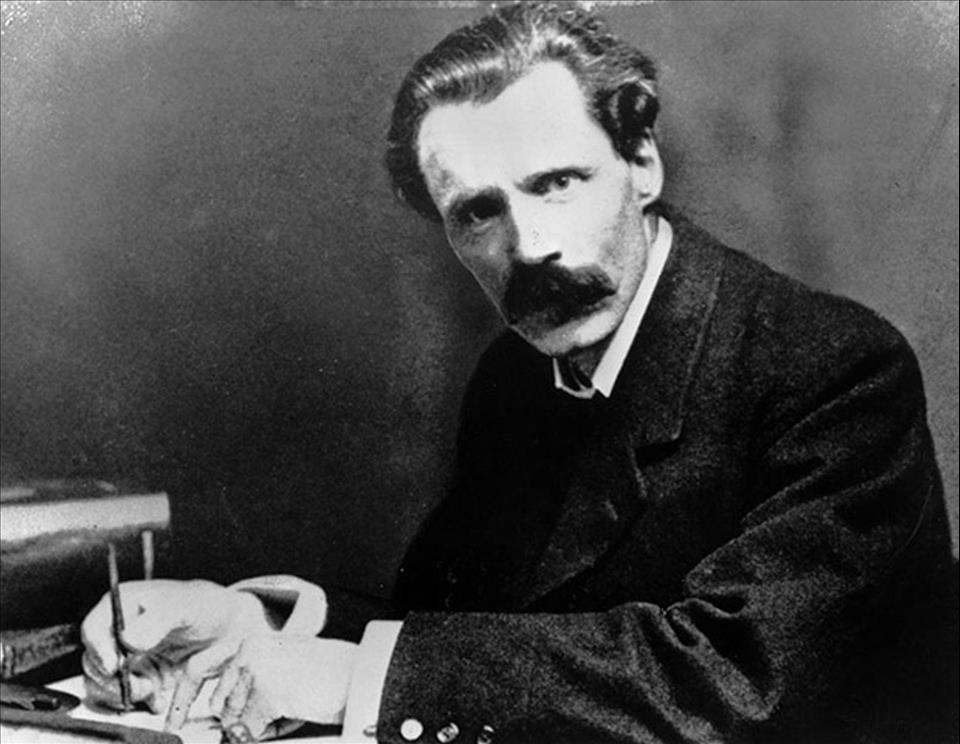
What George Gissing's Fiction Reveals About Vegetarianism In Victorian London
During the 1880s and 1890s vegetarianism wasn't just a dietary choice, it was a growing movement. Restaurants, clubs and societies sprang up across London, promoting the cause through lectures, pamphlets and dinners.
Prominent Victorian activists like Annie Besant, Edward Carpenter and Anna Kingsford championed the cause. In his 1929 autobiography, Gandhi described vegetarianism as a“new cult” of London. A popular vegetarian restaurant's slogan –“Economical, Healthful and Humane” – also summed up its appeal.
For many urban lower-middle-class clerks and retail workers, a vegetable diet promised affordability and health. It was championed by proponents as a natural lifestyle. It contributed to a wider health reform movement and was an antidote to concerns about the global meat market.
Looking for something good? Cut through the noise with a carefully curated selection of the latest releases, live events and exhibitions, straight to your inbox every fortnight, on Fridays. Sign up here .
Vegetarianism sits alongside other Victorian counterculture movements, such as enfranchisement, rational dress, socialism, anti-vivisection, animal rights and pacifism. So it's perhaps no surprise that the movement makes its way into Gissing's fiction.
His vegetarian characters don't merely reflect the modern, urban realism of the period; they carry deeper symbolic weight. In Gissing's hands, meat avoidance acts as a metaphor for self-denial, capitalist duplicity, anti-imperialism, and how women's bodies were defined.
The Odd Women by George Gissing (1893). Wikimedia
In The Odd Women (1893), the vegetarianism adopted by the protagonists, the Madden sisters, is a euphemism for respectable poverty. Near the beginning of the novel, Virginia Madden negotiates cheaper rent on the basis that her vegetarian meals are“so very simple” that she may“just as well prepare them” herself.
By contrast, Piers Otway, the protagonist of The Crown of Life (1899), adopts vegetarianism as a moral choice rather than economic necessity. Along with Bohemianism, cosmopolitanism, pacifism and anti-violence, it's a marker of being an outsider and eccentric.
In Will Warburton (1905), Godfrey Sherwood is a gambler and a charlatan. He adopts vegetarianism for health reasons. Soon, he becomes swept up in the movement. He proposes a vegetarian settlement built on plain living and high thinking. But his sincerity is questionable. The colony is just another in a string of unrealistic business schemes. For Sherwood, vegetarianism is a cause he can embrace and abandon as soon as it stops being profitable.
Gissing's short story Simple Simon (1896) tells of two vegetarian clerks. They are described as“thin-faced and colourless” and seem like stereotypes of the“anaemic crank”. But the story critiques hypocrisy rather than poverty. By the end, neither clerk remains a vegetarian, and the movement is dismissed as a passing fad.
In A Poor Gentleman (1899), vegetarianism is less a choice than a necessity. Poverty dictates character Tymperley's lifestyle – what he wears, where he lives and what he eats. Like Virginia Madden in The Odd Women, he gives up meat to keep up appearances. He then convinces himself of the health benefits and becomes moralistic as a result. This inversion of cause and effect satirises the ethics of ideological vegetarianism.
More than meets the eye1890's colour lithograph from Mrs Beeton's cookery book illustrating a variety of fruits and vegetables. Shawshots/Alamy
Overall, Gissing's work questions whether a meat-free diet can truly offer a healthy and affordable lifestyle for the working class. His fiction suggests that choices born of economic need are not choices at all.
Gissing also critiques idealistic vegetarianism. The back-to-the-land colonies he portrays seem naive and impractical.
These debates over affordability and sustainability feel as relevant today as they did in his time. As modern vegetarianism and veganism movements grow, they face similar challenges.
Gissing's nuanced depictions remind us that food choices often reflect deeper social values – and contradictions. Whether driven by necessity, idealism, or social pressure, vegetarianism remains a lens to examine society's struggles and ideals through.

Legal Disclaimer:
MENAFN provides the
information “as is” without warranty of any kind. We do not accept
any responsibility or liability for the accuracy, content, images,
videos, licenses, completeness, legality, or reliability of the information
contained in this article. If you have any complaints or copyright
issues related to this article, kindly contact the provider above.


















Comments
No comment